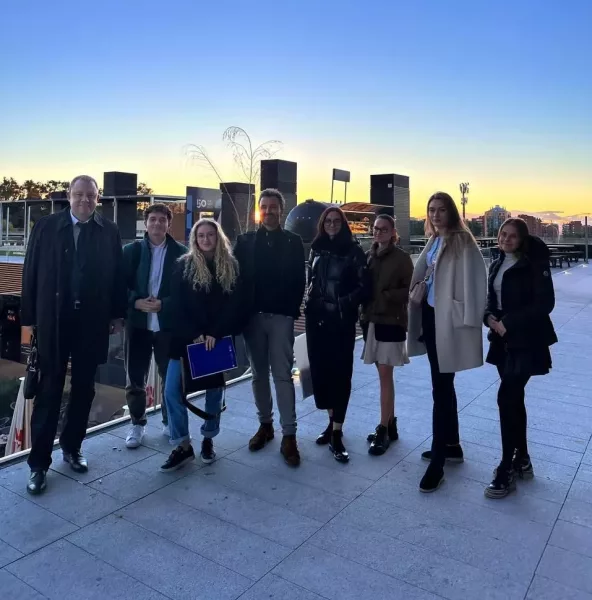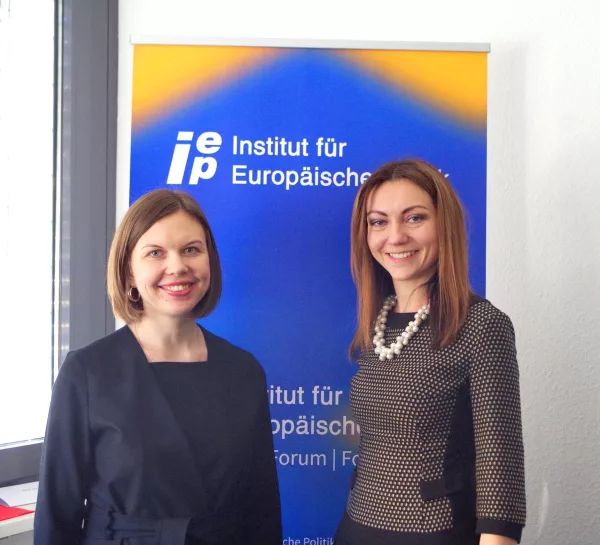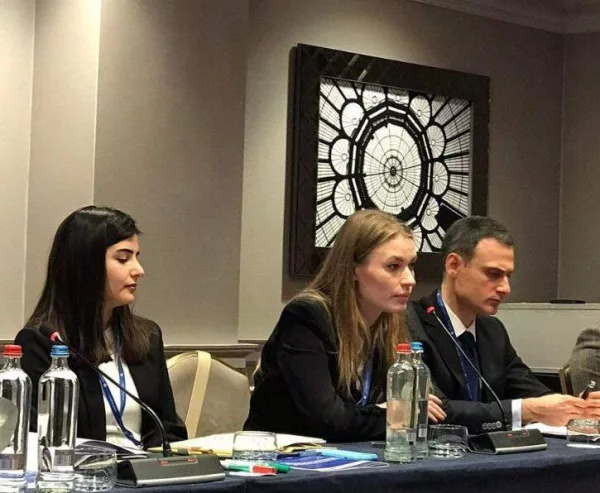Last Tuesday, the 21st of November, 2023, marked Ukraine’s 10th anniversary of the Revolution of Dignity. What began as a rally of a few hundred people on Kyiv’s Independence Square grew into a revolution of thousands, if not millions, of Ukrainians across the whole nation with the unbeatable will to break free from the shackles of Russian dominance and embrace a European future.
Viktor Yanukovych, the Ukrainian President back in 2013, refused to sign the long-anticipated association agreement between Ukraine and the EU, which sparked resentment among the youth. They saw the integration into the European Union as their only way out of poverty and toward a bright future. On the 21st of November, 2013, Mykola Azarov, the Prime Minister of the government at the time, announced that instead, Ukraine would continue fortifying its ties with the Russian Federation, revealing Ukraine’s intent to strongly diverge from the European path. At that moment, the young generation of Ukrainians knew that Europe would remain closed to them forever, so they took to social media to protest.
On the same day, Mustafa Nayyem, a Ukrainian journalist, wrote on his Facebook page: “Okay, let’s be serious. Who is ready to go to the Maidan by midnight today? Likes do not count. Only comments under this post with the words “I’m ready.” As soon as more than 1,000 are collected, we will organize.” And so the Ukrainians launched their first counter-offensive against Russian hegemony, ultimately leading to the fall of Viktor Yanukovych’s power and his shameful exile.

However, the price Ukraine has been paying ever since is immeasurable. In response, Russia, beginning with the occupation and annexation of Crimea in 2014 and then the ensuing armed conflict in Donbas, has sought to subjugate Ukraine into fear and chaos. Today, as we approach the 24th of February, 2024, nearly two years since the Russian full-scale invasion, Ukraine has been enduring the unleashed horrors of war, including the genocide against the Ukrainian people, the raping of Ukrainian women, the abduction of Ukrainian innocent children, and murder of their cultural heritage, yet Ukraine continues to stand as an emblem of resilience against aggression. Ukrainians have proven countless times with their immense sacrifices that they will not be deprived of their European future and that they are Europeans.
Ukraine’s integration into the European Union is not a mere political process but a pure expression of Ukraine’s commitment to a future defined by freedom, democracy, and shared European values. Last week, alongside Stanislav Vynnytskyi and Anastasiia Pustovarova, outstanding students at IE University, and Francisco De Lasheras Borja, who helped organize this meeting, I was honored to talk with several esteemed experts on Ukraine’s accession to the European Union. They have revealed that the integration process has been a complex and multifaceted one with many uncertainties, ranging from the unexpected nature of EU integration to the intricacies of institutional reforms as Ukraine is going down the nuanced path towards full membership.

These last few months, Liubov Akulenko, the Executive Director of the Ukrainian Centre for European Policy, and her colleague Snizhana Diachenko, a Junior Research Fellow, have visited Brussels, Paris, Berlin, and Madrid. In engaging discussions with political consultants, they aimed to better comprehend the dynamics of EU policies. Accompanied by two more Ukrainian experts, Viktoriia Melnyk, and Oleksandr Baienkov, Akulenko explained the current situation,
“In the last nine years, Ukraine has successfully implemented only 30.4% of the Association Agreement. Currently, with so many politicians, consultants, and advocates on the frontlines, the implementation of further reforms has become very challenging. As the EU has started to actively support and intend to accelerate Ukraine’s integration, we must understand how exactly the EU operates and how to navigate this collaboration within the Union.”
Generally, the ascension of new countries to the European Union is inherently a long and troublesome process. Only the implementation of reforms required amount to thousands of documents combined with additional enlargement reforms to improve institutional capacities. What is there left to say when the aspiring country member is embroiled in war, as is the case with Ukraine?

Snizhana Diachenko has been analyzing the terms of agreements and examining Ukraine’s compliance since 2014. By doing so, she ensures the alignment of integration efforts and finds new ways of strengthening Ukraine’s relationship with the EU. Diachenko revealed that the Ukrainian government resources had to be reallocated to address the Russian-Ukraine war, redirecting efforts to military defense, severe humanitarian issues, and negotiations on humanitarian and military support, consequently leading to a decrease in the number of passed reforms. Despite drastic geopolitical changes that occurred due to Russian aggression and brought on deep concerns about Europe’s security, which contributed to Ukraine’s attainment of EU candidate status, Diachenko reaffirms the impossibility of skipping the essential stages of EU accession.
When discussing the future of Ukraine in the EU with consultants across Europe, it became clear that there is a gap – a significant lack of knowledge about Ukrainian constitutional and judicial systems. This presents another challenge to Ukraine’s integration, as some EU countries remain uninformed and unfamiliar with the complexities of Ukraine’s government. Viktoriia Melnyk, European Integration Project Manager for the Centre of Policy and Legal Reform in Kyiv, highlights this issue, “After participating in several discussions, it is evident that there is general diplomatic support for Ukraine. However, when it comes to the application of reforms and necessary regulations, there is almost no reaction – no reactions, no suggestions, no questions, or even expressions of concern.” The lack of direct communication stems from a lack of knowledge about Ukrainian constitutional and judicial systems on the part of some EU member states. The emphasis on diplomacy, rather than the concrete application of reforms explains the silence and signals the urgent need for increased awareness and communication.

It is important to not forget about the economic implications of Ukraine’s accession to the EU, as it is integral to the discussion. Many businesses in Ukraine will have to face temporary losses due to the additional costs associated with implementing certain EU legal acts. These acts, such as safety requirements for road transport, and environmental acts for the agrarian sector contribute to the tightening control over economic entities in Ukraine. The country is progressively restricting state aid, limiting its ability to support businesses affected by the ongoing war. However, the economic challenges extend far beyond these immediate concerns.
Every EU member state has its own interests, making the accession process a delicate balancing act. Melnyk predicts that the agricultural sector will become one of the most contentious issues. In Akulenko’s report summary on Ukraine’s Integration into the EU Internal Market during Wartime, it is highlighted that agricultural products accounted for approximately 50% of Ukrainian exports of goods in 2022, making this sector crucial for the country’s economy amidst conflict. Countries like Poland, Slovakia, and France see Ukraine as a potential competitor inside the Union, especially since, at the end of 2022, the EU accounted for 65% of exports in Ukraine. Despite Ukraine’s successful efforts to continue and fortify trade with the EU, the expensive nature of environmental and EU-related reforms raises questions about funding and potential consequences for Ukrainian businesses in the agricultural sector. Will Ukrainian businesses be strong enough to resist all the challenges, such as the full integration of the EU Common Agricultural Policy and the introduction of the EU Green Deal requirements that will follow after the war?
People in Ukraine wish for progress and economic growth, not another decade of stagnation and survival. Oleksandr Baienkov, Founder of International and EU Sanctions Platform, dedicates his time to designing sanctions against Russia and developing new strategies to combat sanction evasion. In the aftermath of the war, Baienkov underscores the critical need for a transparent approach to implementing EU reforms, “As the nation navigates post-war recovery, the implementation of EU reforms must be approached with foresight and transparency.” It is paramount that politicians communicate the consequences of EU integration, explaining both the challenges and the long-term benefits that will ensure Ukrainian prosperity for decades to come. Ukrainians cannot remain short-sighted, not after everything that Ukraine has sacrificed to be here.

The timeline for Ukraine’s integration into the European Union remains uncertain. Despite its progress, Ukraine faces challenges, ranging from resistance in Poland and the Czech Republic to calls for rule changes in Spain and a singular vote from Hungary that has enough power to obstruct military support for Ukraine. Yet, the Ukrainian people continue to persevere. Akulenko, Melnyk, Diachenko, and Baienkov have demonstrated an unwavering commitment to support Ukraine on this path toward a European future, which reflects Ukraine’s collective efforts to ensure Ukraine’s accession to the EU.
The European Union flags that adorn Kyiv’s landscape alongside the Ukrainian flags are not just a simple decoration. They embody the courageous civil resistance that took root in 2013 and persists to this very day. The legacy of the Heavenly Hundred heroes and all those who continue to fight for freedom and Ukrainian sovereignty have transformed these flags into a symbol of Ukraine’s inseparability from Europe.

These flags tell the story of Ukraine’s defiance against tyranny. Ukrainian people stay strong to honor the memory of those lost in this struggle. In the face of doubt and neglect, Ukrainians never stopped believing in their nation, a story that will be forever ingrained in the hearts of Ukrainians for many generations but also studied in schools as the period of liberty, a period marked by relentlessly brave people who secured Ukraine’s statehood in hopes that centuries from now, the world remembers this period as a timeless symbol of resilience – a period when Ukraine claimed its rightful place, forever intertwined with the shared destiny of Europe.
Featured image: Photo by odessa. Retrieved from Gazeta.ua







